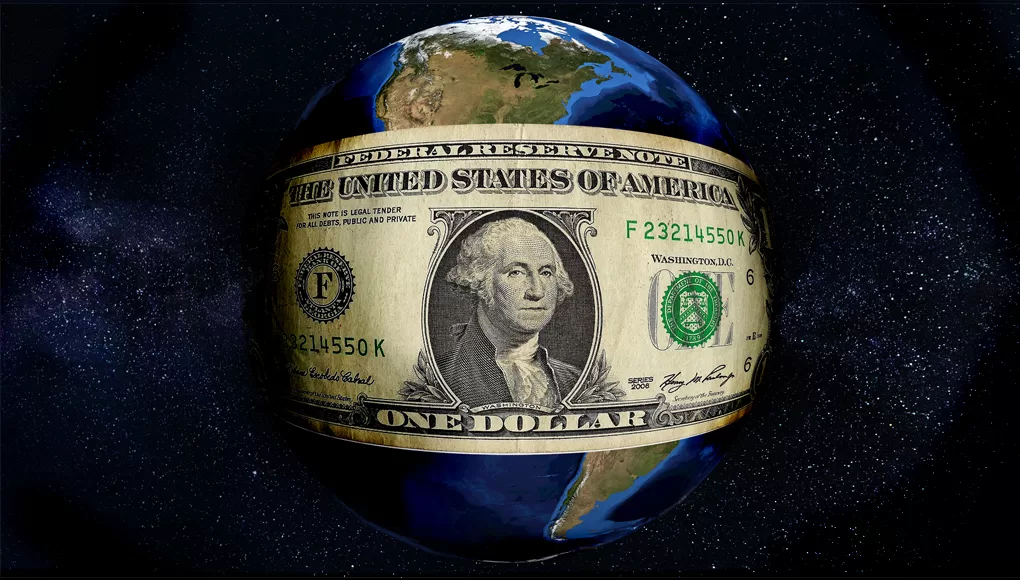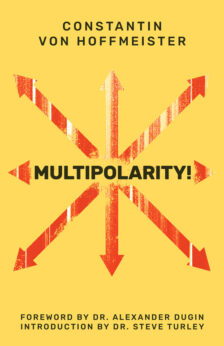In the postmodern world, we find ourselves living in the age of Money-Power. With the exception of a few rogue nation-states or sectarian groups, there are no ‘fascist’ or ‘Communist’ Bogeymen lurking in the shadows. The current left vs. right paradigm we see played out in the political circus is nothing more than a dog and pony show. Instead, we are beginning to see the rise of a new paradigm in the West: the people vs. the elites.
Invoking the term ‘the elites’ is typically reserved for the tin-foil hat crowd tuning into Alex Jones – or at least it used to be. Understanding who ‘the elites’ are is extremely important. However, even more important than knowing who they are is understanding their power structure. Even your average partisan hack will call out the meddling of folks like George Soros or the Koch Brothers. Populists like Steve Bannon or Michael Anton will refer to the elites as the ‘Davosie’1 which is getting much closer to understanding the full scale of the problem.
The problem is nothing other than the very ideological foundation of the West. Liberalism – the triumph of individualism, egalitarianism, human rights, democracy, free markets – has paved the way for the ascendancy of usurers and merchants of the highest order. The Political has been usurped by the Economic. What is ‘The Political’ or what is politics? Politics, or The Political, is activity in relation to power.2 The Political divides the world into friend and enemy,3 whereas The Economic divides the world into consumer and producer. According to the foundational principles of Liberalism, the state is theoretically reduced to a watchman for fear that a state exercising authority may become authoritarian, thus potentially violating individual liberty or human rights. Of course, it is merely a theoretical concept that the watchman state will not exercise power. The watchman state is entirely capable of exercising power, and if ‘the people’ are unwilling to utilize the power of the state, then other actors will. According to Spengler, ‘it must be concluded that democracy and plutocracy are the same thing under the two aspects of wish and actuality, theory and practice, knowing and doing.’4 What we find is that the contemporary Conservative has no understanding of The Political. The Conservative is ideologically shackled by his very own principles, his belief in Liberal ideals such as limited government and the free market. His impotence is derived from his own ideological beliefs. As a political actor, he is entirely useless. Liberalism breeds useless men. It is thanks to useless men that we find ourselves in a situation where we are dominated by Money-Power.
When I speak of Money-Power, I speak of banks, markets, corporations, speculators, international finance, the corporate media etc. These various institutions form the organs of the current capitalist system. In order to change the system, all-out war against these institutions will be required. The capitalism-reformers who wish to rein in the excesses of capitalism are naively wrong because they fundamentally misunderstand the nature of the beast they wish to wrangle. To quote Alain de Benoist,
This is a double error, first, because it is precisely the impotence of the politicians to face the problems inherent in deregulated financial markets that has opened the way for the total liberalisation of the financial system. Second, and above all, because to is to ignore the fact that the very nature of capitalism makes it a system alien to every moral consideration. ‘Capital resents every limit as a fetter’, said Karl Marx. The logic of accumulation of capital is a lack of limitation, the rejection of every limit, the rule of the world by the logic of the market and the transformation of all values into goods, the Ge-stell of which Heidegger spoke.5
It is here we see that Money-Power run amok gives birth to the abstract horror of Globalism. We see its tentacles reach all across the globe, de-territorializing it, deracinating it, exploiting it, atomizing it. Only once it has paved over the planet in concrete and turned it into a giant strip mall will the process of total commoditization6 be complete. Concepts such as identity impose a limitation upon the global-capitalist system. Hence, the beast must either commoditize identity or destroy it.
The economic system has mechanisms in place for breaking down barriers in order to continue its expansion. These various mechanisms affect us culturally, socially and psychologically. Money-Power has created a new man, Homo economicus, to serve as its subjects in the new world order. Per Samuel Francis, ‘the managerial state also is fused with and relies on the mass organizations of culture and communication for the legitimization of its social engineering.’7 Through currency manipulation, therapeutic managerialism, mass media, and corporate advertising, Homo economicus is born. According to Ron Paul,
The Fed encourages irresponsible accumulation of personal debt. People live beyond their means with the help of an expansionistic monetary policy. They trade in their futures for the present. They neglect the need to save in order to consume more and more. In this sense, the Fed is the ultimate promoter of consumerism and living for the present. This amounts to a terrible cultural distortion in which short-term thinking wins out over long-term planning.8
By means of currency manipulation alone, they are able to fundamentally alter the actions of society on an individual level. Through this cultural distortion, we see that the elites have altered the psychology of the individual to abandon long-term planning in favor of ‘living in the now’. An individual who lives ‘in the now’ is less likely to invest the time and resources in family and children. He is more concerned with the immediate gratification that has been internalized by market pressures, which are influenced in turn by monetary policy. These pscyhological internalizations are reinforced by a managerial therapeutic state which uses advertising, education, and propaganda to socially engineer the individual to become an ideal citizen in this new economic order. We see this on a daily basis throughout the West, for example with various media outlets telling us the benefits of not having children. People who are more concerned with ‘living in the now’ certainly do not care for the future of their progeny, and we can infer that they are more likely to disregard their history as well. This is compounded by Liberal individualism and capitalist alienation of the worker. We see the rise of an individual who has become totally atomized. He lacks any sense of belonging to a real community because he has been ‘emancipated’ from ‘archaic’ and ‘taboo’ communities and institutions, only to finally realize that he cannot find peace along this road.
This begins to describe what Christopher Lasch talked about in his book, The Culture of Narcissism, where he describes the development of a societal pathological narcissism that began to appear beginning back in the late 19th century, and which has only intensified as we have seen the progress of capitalism. Here, Lasch describes the inherent narcissism present in Homo economicus:
In the last twenty-five years, the borderline patient, who confronts the psychiatrist not with well-defined symptoms but with a diffuse dissatisfactions, has become increasingly common. He does not suffer from debilitating fixations or phobias or from the conversion of repressed sexual energy into nervous ailments; instead he complains ‘of vague, diffuse dissatisfactions with life’ and feels his ‘amorphous existence to be futile and purposeless’. He describes ‘subtly experienced yet pervasive feelings of emptiness and depression’, ‘violent oscillations of self-esteem’, and ‘a general inability to get along’.9
Lasch goes on to further describe how the narcissist becomes an ideal phenotype for working in business corporations, political organizations and government bureaucracies. Lasch adds, ‘for all his inner suffering, the narcissist has many traits that make for success in bureaucratic institutions, which put a premium on the manipulation of interpersonal relations, discourage the formation of deep personal attachments, and at the same time provide the narcissist with the approval he needs in order to validate his self-esteem.’10 Homo economicus displays sociopathic behaviors which allow him to thrive in this atomized, managerial system. The capitalist managerial state benefits from social engineering individuals with a narcissistic personality. As mentioned previously, their sociopathic tendency to view human relationships in a purely transactional sense makes them ideal cogs in a managerial bureaucracy.
Not only that, but the narcissist makes an ideal consumer as well. Given his vague dissatisfaction with life in general combined with his short-sighted behaviour, he is more likely to consume goods and services, often times recklessly. The consumption of goods provides them with a brief period of happiness in their otherwise empty-feeling lives. As one could imagine, this pathological narcissism, which is present throughout society, impacts other aspects of the human experience, such as relations between the sexes. One need only visit the average ‘manosphere’ website or read F. Roger Devlin’s Sexual Utopia in Power to get a larger picture of the current relations that exist between men and women in the postmodern world.
As one can see from this brief examination into the psychology of the average individual, the tentacles of Money-Power reach well beyond the economic realm and have a firm grasp on psychology, culture, sociology, etc. Through social engineering mechanisms we see the constant push towards cultural homogenization and the promotion of consumerism, with the end goal of creating the abstract ideal of ‘man’ as a consumer. Capitalism knows no other pluralism than the multitude of products, which is only the appearance of diversity. It aspires to a vast, homogeneous market where men can compete for the same possessions.11
What is to be done? Reformism is simply not an option given the degree of corruption that exists within society. Today it is capitalism and the market society on the economic level, liberalism on the political level, individualism on the philosophical level, the managerial-bourgeoisie on the social, and the United States on the geopolitical level12 – these are the enemies. A total comprehensive approach will be necessary in order to combat each of these on their planes of existence. The old saying is that politics makes for strange bedfellows and the same holds true here as unconventional alliances will have to be formed to oppose these enemies. In the mean time, as conflict against the system escalates, we may witness the transformation of this soft totalitarian regime into a hard totalitarian regime; this will become more and more necessary for it if it is to retain its power. We are already beginning to see this with tactics such as deplatforming, censorship, lawfare, and intimidation from the ruling class. If – or better yet, when – such a transformation takes place, you can expect many more people to be ‘awaken’ from their stupor, and for conflict to escalate even further.
The real question is: what will be left of the West when this final conflict is resolved? Only time will tell.
References
1Davosie was a term coined by Michael Anton in his essay The Flight 93 Election. It is a reference to the gathering of corporate, financial and political leaders at the World Economic Forum in Davos, Switzerland.
2Yockey, Francis Parker. Imperium (Wermod & Wermod), p. 167.
3Schmitt, Carl. The Concept of the Political (University of Chicago Press), p. 26.
4Spengler, Oswald. The Decline of The West, Volume II. (Borzoi Books), p. 401.
5de Benoist, Alain. On the Brink of the Abyss (Arktos Media), p. 18.
6Commoditization is the process by which all aspects of human existence have been diluted down to their economic value and nothing more.
7Francis, Samuel. Leviathan & Its Enemies (Washington Summit Publishers), p. 109.
8Paul, Ron. End the Fed (Grand Central Publishing). p. 151.
9Lasch, Christopher. The Culture of Narcissism (W. W. Norton & Company), p. 37.
10Ibid. p. 43–44.
11de Benoist, Alain. On the Brink of the Abyss (Arktos Media), p. 161.
12Ibid. p. 184.








Here are a couple sites run by Don Findlay that propose a radically alternative and more just and moral monetary system to the capitalist system we have now:
http://monetaryreform.com/
http://financialparty.ca/
On his financial party site the monetary system he proposes completely eliminates the need for loans whether you’re buying a house, starting a business, etc. With no loans there is no usury. It completely eliminates the profit problem too and the gap it creates just like interest. Of course this would just be the beginning of change.
For the money question might I suggest the works of C H Douglas, Brooks Adams’ Law of Civilization and Decay, Gottfried Feder, Charles Coughlin, Stephen Mitford Goodson, and my books Opposing the Money Lenders, and The Banking Swindle. The triumph of plutocracy over the West can be traced as far back as the Reformation. Max Weber is interesting on this, and William Cobbett writing on the impact of the Reformation on England and Ireland.
The Left has failed to provide an answer to capitalism, insofar as Spengler said, Marx just appropriated capitalism rather than transcended it, and worked within the materialist Zeitgeist. The Right is intrinsically anti-capitalist.